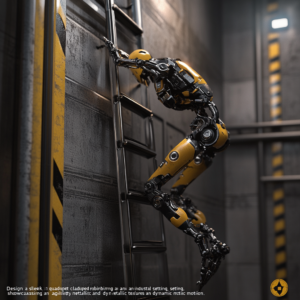
Google Pursues Advanced AI to Rival OpenAI
Google's Pursuit of Thinking AI: A Duel with OpenAI
In the grand arena of artificial intelligence, the landscape shifts daily, like a complex game of chess where the pieces are learning to move on their own. Enter Google, the digital behemoth that has recently decided to challenge OpenAI, our current reigning champion of reasoning engines. Yes, we’re diving headfirst into Google’s ambitious quest for an AI that can think—because, let’s be honest, the future of human-AI interaction could very well redefine our existence.
The Competitive Climate
The rivalry ignited with the arrival of OpenAI's ChatGPT, a chatbot that turned heads—and raised concerns among investors—about whether Google’s beloved search engine might soon be dethroned. It’s akin to a giant waking up from a long nap just to find that a sprightly challenger has been showcasing its skills right in front of its slumbering eyes. This, my friends, is no ordinary tech showdown.
Picture this: two titans, with their vast resources and dizzying innovations, locked in a strategic dance, each trying to outwit the other. While Google's been the long-standing behemoth in tech, OpenAI recently stole the spotlight by transforming our conversational interactions with machines. Time for Google to step up and flex its intellectual muscles.
The Secret Sauce: Chain-of-Thought Prompting
So what’s at the heart of Google’s strategy? A novel trick called chain-of-thought prompting. Visualize this: an AI system that doesn’t simply blurt out an answer, but pauses, ponders, and channels its inner philosopher before responding. It’s almost poetic, isn’t it? This approach allows AI to mirror human reasoning, especially when navigating convoluted inquiries—think math problems or intricate coding tasks.
How does it function? Brace yourself for a sneak peek:
- Pause for Impact: The AI absorbs the prompt and takes a moment. This isn’t just a dramatic flair; it’s a critical step.
- Evaluate the Thoughts: It then reviews related prompts—like a chef tasting different spices before crafting the perfect dish.
- Condensed Wisdom: Finally, it assembles the most cogent and relevant response. Voilà! You’ve just witnessed a chatbot engaging in a mini thought experiment.
This methodology is not only pivotal for tackling complex questions but is steadily becoming the backbone for AI models across both Google and OpenAI. It’s like watching a magician unveil the secrets of their craft, minus the top hat and wand.
Google's Latest Feats
Now, let’s chat about the progress Google has been making. While they may have been cruising at a slower pace compared to OpenAI’s more frenetic beat, they’ve nonetheless been crafting formidable tools. Take a look.
- AlphaProof and AlphaGeometry 2: These mathematical powerhouses were showcased in July, adeptly tackling mathematical conundrums—grabbing notable wins at the International Mathematical Olympiad. Four out of six problems? Quite an accomplishment.
- Gemini Chatbot: In an impressive upgrade, the Gemini chatbot has introduced the 1.5 Flash model, promising swifter and sharper responses. It’s like upgrading from a bicycle to a souped-up motorcycle in the blink of an eye.
- Astra AI Assistant: Unveiled during Google’s developer conference, Astra uses your phone’s camera to answer questions about your surroundings—think of it as your friendly neighborhood Sherlock Holmes, minus the deer stalker hat.
The Competitive Terrain
The stakes are high. Google isn’t merely content with keeping pace; it’s determined to assert its dominance in AI. Here’s the current state of the competition:
- OpenAI's o1 Model: Released in mid-September, the o1 model (internally known as Strawberry) sent shivers down the spines of Google’s DeepMind crew. However, Google’s foothold in the research world has alleviated some of the anxiety in its ranks.
- Ethical Quandaries: Google approaches AI releases with caution, taking time to address ethical implications and ensure a robust level of public trust—an admirable stance, albeit one that can slow progress. It’s like maneuvering through a maze while holding a candle, ensuring the light doesn’t flicker out.
The Future: Who Will Win?
As we stand at the precipice of this technological revolution, the race for AI dominance proves to be more like an epic saga than a sprint. It's a marathon, where the finish line remains elusive. Industry experts like Oren Etzioni emphasize that it truly is “anybody’s race to win,” and both contenders have shown they’re committed to pushing the envelope for the sake of innovation.
Google, with its profound research prowess and ethical oversight, crafts a potent competitor in this dynamic playground filled with possibilities. But will they surpass OpenAI or carve a unique niche for themselves? Only time will tell. One thing is for sure: we’re headed toward an AI era that will be smarter, more accessible, and eerily more human-like than we ever imagined.
Keep Yourself in the Loop
If the realm of AI continues to pique your curiosity (and why wouldn’t it?), then let’s keep the conversation going! There’s a treasure trove of resources available to stay abreast of the latest innovations:
- For peak insights on Google’s AI escapades, don’t miss out on the Google AI Blog.
- Dive into OpenAI’s universe via their OpenAI Blog—packed with the latest breakthroughs and releases.
- And for real-time updates on everything tech and AI-related, subscribe to our Telegram channel: @channel_neirotoken.
Remember, in this exciting age of AI advancements, knowledge is not merely power; it’s essential. Embrace it, share it, and let’s navigate this thrilling journey together!

